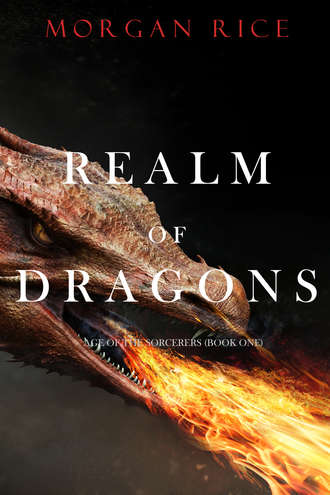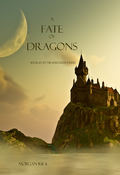
Морган Райс
Realm of Dragons
CHAPTER THIRTY TWO
Odd walked around the monastery and tried to work out how long it would be able to hold out once the bulk of the Southern forces put their minds to taking it. It wasn’t a pleasant calculation. They wouldn’t have brought any siege equipment with them on the ships, and that would buy some time, but not much when the monks were mostly untrained in the arts of walls. Really, all they needed were ladders.
“We’ll need to evacuate,” he said to the others walking with him. For the most part, they were younger monks, because he hadn’t seen the older ones since the attack. “That means that some of us will have to slow them down while we get to—”
“Brother Odd?” A young monk ran up to him. “The abbot requires your presence, Brother.”
Brother Odd nodded. Of course he must speak to the abbot. They had to discuss what to do next, and work out the best way to save as many of the monks as possible. He followed the young monk through the monastery to the abbot’s chambers. The old man sat there in a chair, writing what looked like a series of letters. That wasn’t the part that made Brother Odd stop short, though.
There was a chest by the abbot’s side that Odd recognized. It was made from dark wood that they said had been charred by the fringes of a dragon’s breath, and bound in dull iron. The lock was a simple, solid thing, and Brother Odd was shocked to see that a key sat in it, ready.
“I thought that had been destroyed,” he said, without thinking.
“Typically, a brother waits for the abbot to speak,” the abbot pointed out. He looked up at Odd. “Although this is not an issue in this case.”
“What?” Odd said, incapable of saying more. Already, his thoughts were racing with the possibilities of what might follow. The abbot couldn’t mean to—
“When you came to us,” the abbot said, “you told me that you wanted to be a different man. You gave away the things that you had come with, renounced who you were. I told you at the time that it does not work like that, and have told you several times since.”
Odd could remember the most recent conversation, when he’d been unable to rid himself of the memories of all he’d done.
“Even so,” the abbot continued, “I had thought that you might come to terms with who you were, and you were at least a loyal and dutiful brother of our monastery. Until earlier.”
“They were going to kill you,” Odd said. “I know that the order’s rules forbid violence, but—”
“That is just it,” the abbot said, with a sad smile. “You are seeking an excuse now, as you have sought excuses since you arrived. I am not the man I was. I did not know what would happen. It was necessary. They were going to kill you. Sometimes you must accept responsibility, Sir Oderick.”
“Do not call me that,” Odd said. He’d thought of himself that way in the battle, but to hear it from the abbot’s lips hurt too much.
“Why should I not?” the abbot asked. “Will you strike me down for doing so? Will you kill me?”
“Of… of course not,” Odd said. “I am a brother, and you are my abbot. I could never harm you.”
The abbot considered him for several seconds. He stood. There was a power to the old man now that had nothing to do with violence.
“If you were a brother, you would have obeyed my instructions,” the abbot said. “I commanded you to kneel in silence and wait. You chose not to do that.”
“If I had, you would have died!” Odd said, and there was more force in his tone than he intended.
“I would have,” the abbot agreed. “And those with me, but the monastery would have been spared, because the men here would have surrendered. You would not have blood on your hands.”
“What kind of man can stand by while good people are killed?” Odd demanded.
“A monk,” the abbot said simply. He shook his head. “What do you think will happen now?”
“They’ll come at us,” Odd said. “Probably a couple of scouting parties at first, then in force. If we can hold them, then that might give us enough time to escape over the sea. There are enough small boats around the island for that.”
“No, that is not what will happen,” the abbot said. “Because that will result in more death. Instead, I will go out to them.”
“They’ll kill you,” Odd said.
“Yes.”
“You… you can’t!”
The abbot’s look this time was one that had a hard edge to it. “If you truly think that I fear death, then you have learned nothing in your time here, Sir Oderick.”
“I am not that man,” Odd said.
The abbot shook his head. “You are not a monk. What else you are is up to you.”
Not a monk? The words caught Odd by surprise, as brutal as a blow might have been. He reeled from them.
“What are you saying?” he demanded.
“You have done violence here, and wish to do more,” the abbot said. “You have ignored my instructions, and worse, some of the other young monks are starting to look to you as if your way is a kind of answer. That cannot be permitted. From this moment, you are no longer a brother of this monastery. You will leave, and not return.”
“Just like that?” Odd said. He could feel the old anger rising in him, the one that threatened to drown out the rest of him. No, he wouldn’t be that man.
“Turn the key in the lock,” the abbot said. “It is time to take what is yours. There is no place for it here, or for you.”
“I don’t want to,” Odd said.
The abbot looked at him evenly. “What we want doesn’t come into it. Sometimes there are things we must do.”
Odd let out a snarl and knelt before the chest. He turned the key in the lock, forward and then back again, to avoid the dart he’d had placed there by a cunning man of the House of Weapons long ago. He opened the lid carefully, feeling more fear than he’d ever felt in the run up to a battle.
Within, there were a noble’s clothes, with the symbol of the blackened flame upon them. There was armor, and a pouch filled with money that Odd had brought in the hope that he could bribe his way into the monastery. There was a second pouch that contained his signet ring and the jewels of his family.
Atop lay a sword. It was long and slender, with a grip designed for two-handed use and an elegantly scrolled hilt of dark metal. Its blade was covered by a sheath of black leather, but Odd’s memory supplied the brightness of the steel and the etchings upon it. Odd knew the work that it had taken to produce, because he’d had to wait for it for so long that it had been like waiting for news of a lost lover. Now it seemed to call to him in the same way.
“Take what is yours, Sir Oderick,” the abbot said. “Take it and be gone. Take a boat if you will. Maybe the act of my dying will give you time.”
Odd fingered the armor, but he let it lie, along with the noble’s clothes. He took the sword, though, because there were some bonds too strong to ignore. He took the pouches too, because he would need their contents, along with a length of rope. He stood and stared at the abbot.
“I might no longer be a brother, but I am not Sir Oderick either,” he said. “And you… you are a fool who is about to die for no reason. You could run.”
“But then I would not be the man I am,” the abbot said, and those words made Odd angrier than ever. He turned before he could act on that anger.
“I’ll go,” he said. “And if your monks have any sense, they’ll go too. King Ravin’s men aren’t here to be kind or gentle.”
He stalked from the abbot’s quarters, heading through the monastery. He was aware that the brothers there were staring at him, but right then he didn’t care. Let them stare. Let them all see the man he was, the man who had saved their miserable lives. He headed for a patch of wall he hoped he would be able to climb down, seeing brothers turn toward him as he passed. When he reached the part he wanted, he looked down. Good, there were no enemies below this spot, only clustered around the gate.
Odd turned to his home… his former home, and called out.
“The abbot is going to open the gates. If you think they won’t slaughter you, then you’re fools. I know what kind of men they are, because I was that kind of man. Run now, while you can.”
None of the monks below moved. Fools. Odd sneered at them as he started to clamber down the wall, his sword slung across his shoulder. It was the only thing right then that kept his heart from breaking at the home he’d had and lost, and at the thought of the monk he’d failed to be. He slipped down in silence, moving through the shadows so that any soldiers watching wouldn’t be able to spot him.
He set out across the island, keeping to the small paths, heading for the little inlets and coves around the island. From here, he could see the soldiers surrounding the monastery. He hoped his brothers, his former brothers, would be safe.
Finally, he came to a cove. There was a small boat there, with a mast and a sail, a pair of oars, and enough room for supplies. Odd settled what he had into it, untying the rope that held it to the shore.
“Where now?” he asked himself.
The truth was that he didn’t know. He didn’t want to go back to who he’d been, and he couldn’t be a monk, so what did that leave? Who did that leave?
He guessed there was only one way to find out.
CHAPTER THIRTY THREE
“Another round on me!” Renard called out, and the cheer he got from the other patrons of the Broken Scale was bigger than anything he would have gotten playing the lute. Probably he should have felt worse about that, but how could he feel bad about anything right then?
“You’ll have no coin left at this rate,” Yselle pointed out to him, as he reached the bar. Renard leaned on it, and if that happened to give him a better view of her, well, he was only human.
“Ah, you know I can never hold onto anything,” Renard said. “Coin, women…”
Yselle smacked him playfully on the arm. It felt as though it would leave a bruise.
“I’d better be the only one you’re holding onto,” she said. She started to pour drinks.
Renard didn’t say anything. He thought it probably counted as diplomatic.
“How much do you have left?” Yselle asked, in the tone of someone concerned that he might not be able to afford the round he’d just ordered.
“Aha, I knew you only wanted me for my money,” Renard joked. It earned him a matching bruise on his other arm. “How has this turned into the dangerous part of this undertaking?”
“How much?” Yselle asked. “Please tell me you haven’t spent it all already. You’re not getting any younger, you know. You can’t just keep putting yourself in danger and hoping it will turn out right. You need to settle down, put something away.”
“Maybe invest in an inn?” Renard suggested. “Maybe settle down with a good woman?”
Yselle laughed at that. “And how would you know the difference?”
Renard definitely knew the difference. He knew how good Yselle was to him, and maybe… but then, thoughts like that were almost as dangerous as a dozen guards; certainly capable of trapping him quicker.
“There’s some money left,” Renard said. “Obviously, I had to pay off the guard who helped me, and the sailor. Then quite a bit of it…” He hesitated.
“You gave it away, didn’t you?” Yselle demanded, in that stern tone she seemed to do so well.
“Well…” Renard began, but the lie he was coming up with wilted under the weight of her stare. “Some of it. A bit. Okay, most of it.”
On that note, he could see a group of poor peasant farmers in one corner of the Broken Scale’s taproom. Renard wandered over to them, taking a small pouch of the coins he’d liberated from Lord Carrick and placing it on the table.
“What’s this?” one of them asked, giving him a suspicious look. He was a broad-faced man of about forty, who had obviously worked for far too long in the sun because it had left him as weather-beaten as old stone.
“I hear times have been hard this year,” Renard said. “Taxes, a poor harvest… hard times all round.”
“And you’re giving us money?” the farmer said.
“Lord Carrick is giving you money,” Renard said with a smile. “He just doesn’t know it. There should be enough there to pay your next round of taxes, at least.”
Another of the men stood up, embracing Renard in a bear hug that stank of sheep.
“Thank you,” he said. “My family will eat this winter. Who can I say helped them?”
A humble man would have backed away, pretending that it was nothing. But then, Renard had never pretended to be a humble man. He stepped back and gave the elegant performer’s bow he’d perfected for the rare moments when he got applause.
“Renard, at your service.”
They did applaud him then. He straightened up with a smile, caught his balance before his drunken feet could trip over themselves, and strode back to the bar. Well, more staggered than strode, but what could you do?
Yselle grabbed him as he got close enough and kissed him. “You,” she declared as she pushed another tankard toward him, “are an idiot. A beautiful, wonderful idiot. What kind of man robs the local lord and then gives it away?”
“Well,” Renard said. “If I kept the gold, I’d only drink it anyway.”
He downed the beer in one, and could see Yselle’s eyes still on him. This was shaping up to be a good evening.
***
There were no words to describe how much Renard’s head hurt when he woke. Even opening his eyes hurt. Frankly, he felt as though having his head split open with an axe would be a blessed relief.
As if in some sick answer to that prayer, Renard’s eyes started to focus, letting him see the swords just inches from his throat.
“Up,” a voice barked, “nice and slow.”
“If you think I’m moving anywhere quickly,” Renard muttered, “you’ve never been properly hungover before.”
Looking round, he saw that he was in his room in the inn, not Yselle’s, which was probably a blessing. He didn’t want her dragged into the middle of this. He didn’t want him dragged into the middle of this, but that part didn’t seem to be optional.
Instead of her, there were about a dozen of Lord Carrick’s… well, finest was probably too strong a word, but they were big, and they were tough.
“What’s all this about, lads?” Renard said, trying for charm. It was amazing what charm could get you into, or out of. “I’m sure all this is some big misunderstanding.”
“Oh, no misunderstanding,” one of the guardsmen said. He lifted up Renard’s coin purse, tipping out a wash of the stolen gold. “Just a mistake you shouldn’t have made.”
“Oh that,” Renard said. “There was this man giving out coin last night, and who’s going to say no to free coin? I mean, you wouldn’t, right?”
Renard could only put the clumsiness of his attempt to bribe them down to his aching head. It wasn’t improved when one of them hit him.
“If you do that again,” he said, “there’s a very good chance I’ll throw up on you.”
Right then, it was about the only threat he could muster. One, even two of them he could have fought clear of, but a dozen?
“You’re the one who was giving out coin,” one of the guards said. He beckoned and yet another guard came in, holding a familiar figure by the arm. Renard recognized the broad-faced farmer instantly.
“That’s him,” the man said, pointing. “That’s the one who gave us those strange-looking coins. Just remember I’m the one who told you. I’m loyal.”
Renard sighed. There was just no helping some people. Try to do a good thing for them, and they only found a way to turn it into trouble. Or maybe it was him; he’d always had a knack for finding trouble where there hadn’t been any before.
“Oh, him,” Renard said. “He’s just jealous because I beat him in a card game and won all these coins off him. If you ask me, he’s probably the one who stole them.”
“You announced your theft to the entire inn,” the peasant pointed out.
Ah, he’d done that, hadn’t he? Exactly how drunk had he been last night?
“We’ve all the evidence we need,” the guard said. “We have coins that could only have come from Lord Carrick’s supply, and a witness who says you were the one who gave him them. I’m sure that when we put them to the question, the others in the inn will say the same too.”
Put them to the question? For an instant, just an instant, Renard had an image of these men trying to force answers out of Yselle, maybe treating her like a co-conspirator. That thought was enough to send Renard surging forward, with all the force and fury of… well, that was the problem really. He was still too hungover to fight, and one of the guards simply stepped out of the way, hitting him behind the ear with the hilt of his sword. This time, he did throw up.
Strong hands grabbed him, pulling his arms behind his back and binding them.
“If it were up to me,” the guard who seemed to be in charge said, “I’d take you out and hang you right away as an example, but you’re lucky. His lordship wants to know how you found out about his treasure, and after that… well, maybe you aren’t so lucky after all.”
“I’m always lucky,” Renard managed as the guards started to drag him away. “Can’t you tell?”
He forced a smile, but only ended up spitting blood. This was bad, worse than even the time when… well, frankly, worse than all the times. Before, he’d always been able to fight his way out, or talk his way out, or just run away in an act of brazen cowardice that definitely didn’t make it into his retellings of his deeds. Now though, he couldn’t see how he was going to get away with this.
He was going to die.
CHAPTER THIRTY FOUR
Erin rode toward the village, not stopping, not able to stop. It was all very well the others saying that they should hang back and wait for more knights, but every moment that they waited was a moment in which the people in the village, the quiet men pretending to be villagers, might leave and get away with the things they’d done.
Erin couldn’t allow that, whatever it might cost.
The possible cost flashed by her on either side as she rode in between the scarecrows they’d formed from the actual villagers. Erin thought about what it might be like to be tied there like that, left out for the scavengers, killed and abandoned. That only fueled her need to do this.
“Come back, you fool!” Til shouted behind her. Fenir was with him, the two galloping along in Erin’s wake. Erin supposed that from the outside, they must have seemed like an arrow wedge of charging knights, rather than one charging princess and a couple of knights trying to catch up to her. She almost laughed at the thought, then remembered what she was charging into and stopped herself.
A couple of crossbow bolts flashed past as Erin charged, close enough that she felt the thrill of fear that came with the near miss. She gripped her short spear tight in an overhand grip, ready to strike down with it as she charged. The supposed “villagers” were drawing weapons now, ready to fight.
“Die!” Erin roared, striking down at the first of them as he was still trying to reload his crossbow. Almost obligingly, he did, her spear plunging deep into his throat and ripping clear again. Erin leapt from her moving horse and it slammed into a group of them, scattering them and crushing one man while Erin was still rolling back to her feet.
They came at her then. One cut with a curved blade and Erin blocked it with the haft of her spear. Another lunged forward with a long sword in two hands and Erin felt it scrape from her chain shirt as she swayed aside. She struck back with her spear, one blow, then another, trying to find a way through.
More of the soldiers disguised as villagers came forward then, trying to encircle her. There were men and women there, armed with a wider range of weapons than Erin had seen. Some had swords, others daggers or axes. One woman had a morning star, the head of which she twirled before swinging it at Erin to try to tangle her spear. Erin let the chain of the thing wrap round the haft of her weapon, then went in with it, launching a crunching head butt into the woman’s face. She fell back and Erin stabbed her.
The others tried to close in around her, but Fenir and Til were there then, slamming into the enemy with all the skill and force of trained knights of the Spur. Til hacked downward from his perch on his horse, while Fenir dismounted on the run, advancing with sword and shield to batter at the nearest foes.
Erin didn’t have time to watch them, though, because she had her own opponents to worry about. The one with the curved sword was coming at her again, with a wicked series of slashes that threatened to catch her out with the slightest misstep. Erin used the sheath for her spear head like a shield, deflecting the blows one by one, but then the one with the longsword was coming at her from the side, weapon raised.
In desperation, Erin threw herself into a ducking roll, thrusting upward with her spear as she came out of it. She felt the head of it slide upward into flesh, and the man gasped, his longsword clattering to the ground before he fell.
Erin tried to pull her spear out of him, and for a moment, it stuck. She felt something slash across her leg and she cried out in pain; then she set her foot on the dead man’s chest and wrenched the spear clear. She turned in time to parry another slashing blow of the sword, then cut back with a swipe of her own weapon at throat height. She tore through the soldier’s throat, and this time, she didn’t pause, but plunged back into the fight.
She could see Til fighting on foot now, his horse down. There was an arrow sticking from his shoulder, but it didn’t seem to be slowing him. Erin saw one of the enemy coming up behind him with a dagger, and there was no time to get there. Erin hefted her spear and then threw it, the weapon plunging into the man’s chest to bring him down.
It left Erin facing her last foe, a woman armed with an axe, armed with only the staff-like sheath of her weapon. She parried the first swing, catching the head of the weapon on the stave, and then the two of them were pressed in close to one another, striking and pushing, trying to find an angle for the next blow. Erin tried to get to her belt knife, but in the tightness of the battle, it was hard to do even that.
Erin felt her foot catch on something, had a moment to register the corpse of the first opponent she’d killed, and then she was tumbling backward to the ground. The woman with the axe was standing over her, her armor shining out now beneath the tears in her peasant’s garb.
“Should have stayed away, girl,” she said, in an accent that was clearly from the south. She lifted the axe, and in that moment Erin knew there was no way to dodge it in time, certainly no way to parry it without a weapon. If she’d still had her spear, she might have been able to strike back, but like this… she was going to die.
Erin found herself thinking of her family. She missed them in that moment. Missed her sisters, even her brothers. She wished they’d been able to understand that she wasn’t like them. She wished… she wished so many things…
Then Fenir stepped in and cut the axe woman’s head from her shoulders, cutting short all of those thoughts. He looked down at Erin.
“Shouldn’t throw your weapon,” he said, terse as always, before turning back to the rest of the fight.
Except that now, there was no fight, because Til was just finishing the last of their enemies, cutting him down with a wet, sticky sound. Erin forced herself back to her feet, gritting her teeth against the pain of the cut in her leg. She wasn’t going to let the others see her weak. She hobbled over to the body with a short spear sticking from it and dragged it out. Cleaning it meant that she had something to do to take her mind from the post-battle shakes that were starting through her, threatening to take over her whole body.
“Should bind that wound,” Fenir said, nodding toward her leg. “Could get infected.”
Beside him, Til was less generous. “What were you thinking?”
“What?” Erin countered. “We won, didn’t we?”
They had won. The three of them against a dozen or more foes, and they’d won. It seemed that everything they’d said about the Knights of the Spur was true.
“And what if there had been more of them hiding in the buildings?” Til demanded. “What if there had been just one more, to distract Fenir while you were nearly dying?”
“Ease off,” Fenir said. “She fought well.”
Til shook his head. “She took stupid risks, almost died, and got herself wounded. More than that…” He returned his attention to Erin. “More than that, you ignored everything I said about the need to wait.”
“What if they’d run?” Erin shot back. “What if they’d left while we were waiting? What if they’d gotten away with it?”
Til must have heard the fury in her voice at that thought, because he took half a step back.
“Do you think I wanted them to get away with what they’d done?” he asked, softly. “I’m as glad they’re dead as you are, but we have to think bigger than that. We have to think about saving the people who are still alive.”
“Well, we’ve stopped them from killing anyone else too,” Erin said.
Fenir spoke then. “Not about that. These are Quiet Men.”
“Which means what?” Erin asked. Maybe it was the pain in her leg, but she didn’t have time for his terseness right then.
“Which means,” Til explained, “that there’s something bigger going on. The Quiet Men are the spies and advanced forces of the southerners. King Ravin sends them out to do specific tasks, or he sends them out like here, as scouts.”
“Scouts?” Erin said. “You mean—”
“I mean that they took this village so they would have somewhere safe to bring more men,” Til said. “There’s nothing special here, nothing valuable, so it’s the only thing that makes sense. They were preparing the ground, opening the way. And if we’d died trying to stop them, no one else would have known. Do you understand?”
Erin understood. If these were scouts, it meant that the rest of an army wouldn’t be far behind. There was an invasion coming from the south, and she’d just experienced the first touch of it.







